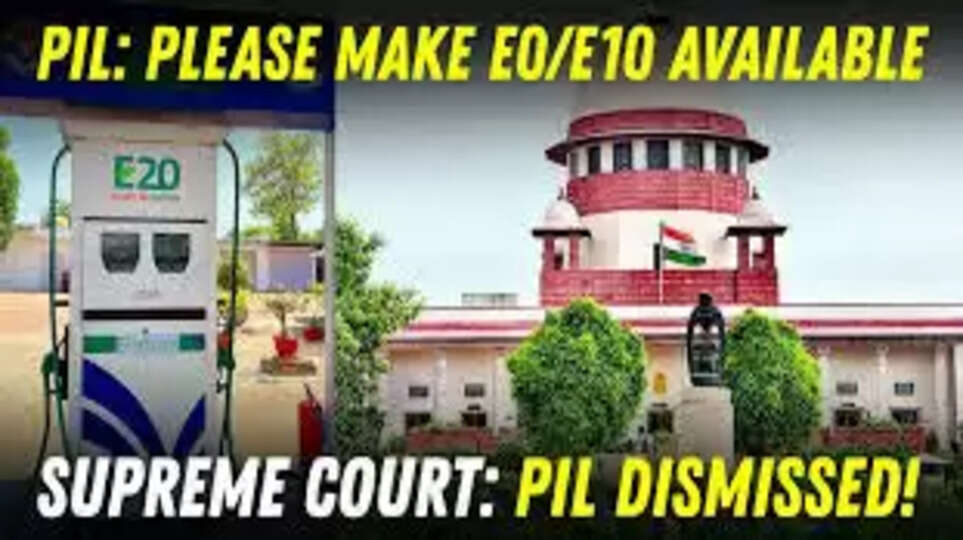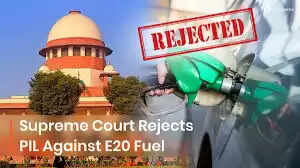Court Backs Green Fuel: Supreme Court Upholds E20 Petrol Mandate, Dismisses Plea Seeking Ethanol-Free Option
The Supreme Court dismissed a plea challenging the nationwide rollout of 20% ethanol-blended petrol (E20). The ruling upholds the government's clean energy policy, prioritizing energy security and farmer support over compatibility concerns for older vehicles. This comprehensive article explores the legal, economic, and environmental implications of the E20 mandate.

Introduction
The journey toward a greener, more self-reliant energy future for India took a decisive step forward as the Supreme Court of India dismissed a Public Interest Litigation (PIL) that sought to challenge the mandatory rollout of 20% Ethanol-Blended Petrol (E20). The plea, which argued for the continued availability of ethanol-free petrol (E0) for consumers, particularly those owning older, non-compliant vehicles, was ultimately rejected by the Apex Court. This ruling is a strong judicial affirmation of the government’s ambitious Ethanol Blending Programme (EBP), solidifying E20 as the dominant motor fuel in the country.
The matter placed before the bench—comprising Chief Justice B.R. Gavai and Justice K. Vinod Chandran—was not a simple technical dispute but a profound clash between consumer choice and national policy objectives. On one side stood the consumer, represented by the petitioner, raising valid concerns about potential engine damage, reduced fuel efficiency, and voided warranties for vehicles manufactured before April 2023. On the other side, the Union Government vigorously defended the policy, citing its immense benefits for energy security, foreign exchange savings, environmental emission reduction, and the upliftment of sugarcane farmers.
This article provides an in-depth exploration of the court's reasoning, the core arguments presented by both sides, and the far-reaching economic, environmental, and practical implications of the E20 mandate. With this judicial green light, the onus now shifts entirely to vehicle owners and the automotive industry to accelerate their transition to a blended fuel ecosystem. The verdict marks a crucial pivot point, signalling that India is firmly committed to its renewable energy roadmap, regardless of the transitional challenges.
The Core of the Dispute: Compatibility vs. National Interest
The petition dismissed by the Supreme Court, filed by advocate Akshay Malhotra, hinged on a single, powerful argument: the lack of consumer choice. The plea contended that millions of existing vehicles, including many manufactured before 2023 and some early Bharat Stage VI (BS-VI) compliant models, are not fully compatible with E20 fuel. Compelling motorists to use a fuel that could potentially cause corrosion, material degradation, and a drop in fuel efficiency (estimated by a NITI Aayog report at 3-6%) was argued to be a violation of consumer rights, particularly since the use of non-recommended fuel could void manufacturer warranties and insurance claims. The petitioner sought the continued availability of ethanol-free petrol (E0) and mandatory clear labelling of ethanol content at dispensing units.
Conversely, the government, represented by the Attorney General, vehemently opposed the plea, asserting that the E20 policy was a carefully considered, high-stakes decision driven by "national interest." The key arguments presented in defense of the EBP were:
- Energy Security: Ethanol blending is a strategic measure to reduce India’s heavy reliance on costly crude oil imports, saving billions in foreign exchange.
- Farmer Support: The program creates massive, guaranteed demand for domestically produced ethanol, directly benefiting the country’s sugarcane and grain farmers, providing income stability, and addressing crop surplus issues.

The Court’s Ruling: Non-Interference in Policy Matters
The Supreme Court bench ultimately sided with the Union Government, adopting a posture of judicial restraint. The fundamental principle guiding the dismissal was the established legal precedent that judiciary should not interfere with executive policy decisions unless they are found to be manifestly arbitrary, illegal, or constitutionally invalid.
The Court acknowledged the government's arguments regarding the policy's benefits for sugarcane farmers and energy independence. By giving primacy to the overarching national and economic benefits, the Court essentially determined that the transition costs and inconveniences faced by individual vehicle owners—while real—did not constitute grounds to halt a major strategic policy direction of the government. This ruling effectively upholds the supremacy of the executive's policy-making authority in matters of economic and environmental reform. The ruling sends a clear message that the move to E20 is a "logical progression" that is here to stay.
Implications for the Automobile Sector and Vehicle Owners
The SC's decision has profound implications for the entire Indian automotive ecosystem:
-
Mandate Finality: The verdict provides finality to the E20 rollout, removing any legal ambiguity. Oil marketing companies (OMCs) can now accelerate their infrastructure changes, knowing there will be no legal obligation to offer E0 or E10 petrol.
- E20-Ready Vehicles: The industry's focus will now entirely shift to ensuring that the entire range of new vehicles—from two-wheelers to four-wheelers—is 100% E20-compliant. Vehicles manufactured after April 2023 are generally compliant, but this will become a non-negotiable standard across all segments.
- Older Vehicles' Fate: Owners of pre-2023 vehicles are left with a difficult choice. While the government and industry have dismissed claims of catastrophic damage, they acknowledge a potential 3-6% dip in mileage and a need for more frequent checks of rubber and fuel system components for corrosion. Many owners may have to proactively replace specific ethanol-sensitive parts (like seals, gaskets, and hoses) with E20-compatible alternatives at their own cost to mitigate long-term damage risks.
-
Warranty and Insurance: The petitioner's concern regarding voided warranties remains a grey area. While manufacturers will honor warranties on E20-compliant components, claims related to damage directly attributed to the use of E20 in a non-compatible vehicle could still face scrutiny. This puts the onus on the consumer to understand their vehicle's compatibility.
The Environmental and Economic Dividend
The E20 mandate is a cornerstone of India's commitment to climate action. Ethanol, as a biofuel, is a renewable source that sequesters atmospheric carbon dioxide during the growth of feedstock crops (like sugarcane), making it a more environmentally friendly option than pure fossil fuels.
The economic benefits are equally compelling. The consistent demand for ethanol shields the agricultural sector, particularly sugarcane farmers, from volatile market price fluctuations. Furthermore, official government estimates indicate that advancing the E20 target to 2025 has already led to substantial savings of over $4 billion in foreign exchange, a crucial boost to the nation's trade balance and energy independence goals.
Global Context and the Way Forward
The PIL had pointed to practices in the US and EU, where options for ethanol-free fuel or clear labelling are mandatory. While the Supreme Court did not mandate the E0 option, the push for clear consumer information remains critical. The automotive industry and OMCs must step up efforts to transparently communicate the fuel's composition and its impact.
The focus going forward must be on second-generation (2G) ethanol production, which utilises agricultural waste (like crop residue) instead of food-grade crops, addressing the potential ethical debate around diverting food sources for fuel. The EBP is now firmly cemented as a key component of India's strategy to meet its climate commitments and reduce its reliance on fossil fuels, with the judiciary offering full support to the national policy.
FAQ's
Q1: What exactly is E20 petrol, and what was the main concern raised in the Supreme Court plea?
A: E20 petrol is a fuel blend consisting of 20% ethanol and 80% petrol. The primary concern raised in the Supreme Court petition was that millions of vehicles manufactured before 2023, which were designed for lower ethanol blends (like E10 or E0), are not compatible with E20. The petitioner argued this incompatibility could lead to engine damage, a drop in mileage, and potential voiding of insurance/warranty claims, and therefore sought the option to buy ethanol-free petrol (E0).
Q2: Why did the Supreme Court dismiss the petition against the E20 policy?
A: The Supreme Court dismissed the plea primarily on the grounds of judicial restraint in matters of government policy. The Court accepted the Union Government's argument that the E20 policy serves significant national interests, including boosting the income of sugarcane farmers, saving foreign exchange by reducing crude oil imports, and contributing to lower carbon emissions. The Court effectively prioritized these national, economic, and environmental policy goals over the transitional concerns of individual consumers.
Q3: How will the E20 rollout affect older vehicles manufactured before 2023?
A: Older, non-compatible vehicles may experience a 3-6% reduction in fuel efficiency and face potential long-term issues like corrosion or premature wear of certain rubber and plastic fuel system components (like seals and hoses). Owners of such vehicles are advised to consult their mechanics about replacing these ethanol-sensitive parts with compatible materials. Newer vehicles manufactured since April 2023 are generally built to be E20-compliant.
Q4: What are the key national benefits of the Ethanol Blending Programme (EBP)?
A: The key national benefits are:
- Energy Security: Reduced dependency on foreign crude oil, stabilizing the economy.
- Economic Upliftment: Creation of a reliable market for agricultural feedstock, significantly boosting the income of sugarcane and grain farmers.
- Environmental Gains: Lowering greenhouse gas emissions, particularly CO and CO2, aligning with India's Net Zero and climate commitments.
Q5: What was the petitioner's secondary request regarding clear labelling at petrol pumps?
A: The petitioner, while focusing on the choice of E0, also strongly requested a directive for mandatory and clear labelling of the ethanol content (e.g., E20) at all fuel dispensing units. This was meant to ensure consumer choice and awareness under the Consumer Protection Act, allowing motorists to make an informed decision, especially concerning the compatibility of the fuel with their vehicle.
Conclusion
The Supreme Court’s rejection of the petition against the 20% ethanol-blended petrol (E20) rollout is a clear and powerful endorsement of the government’s bio-fuel policy. By refusing to interfere, the Court has irrevocably committed India to a future where E20 is the norm, prioritizing the macro-economic and environmental benefits of energy self-reliance and farmer welfare over the micro-level compatibility issues of older automobiles.
The judgment is a catalyst for change—it mandates the automotive industry's complete transition and pushes consumers of older vehicles to adapt to the new fuel reality. The focus must now shift from questioning the policy to ensuring a smooth, safe, and transparent transition, by accelerating infrastructure upgrades, promoting E20-compliant vehicle sales, and providing clear, actionable guidance to all motorists. India’s path to a greener, more energy-secure future is now judicially cemented.
